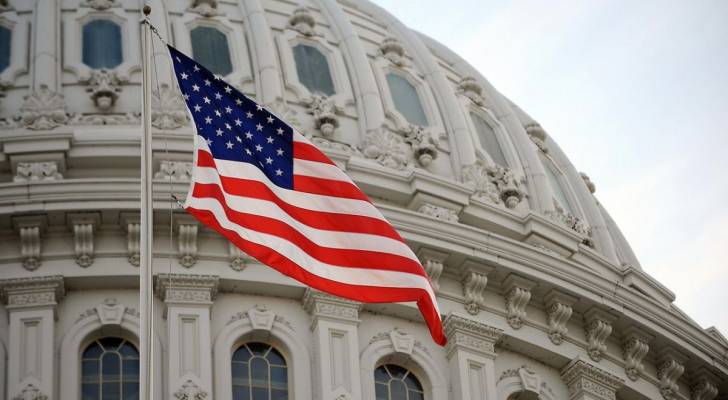US Senate with the American flag
Senate passes Trump’s $3T 'One Big Beautiful Bill' act after 24-hour vote marathon
The Republican-dominated US Senate approved President Donald Trump’s sweeping domestic policy bill on Tuesday, known as the "One Big Beautiful Bill Act," advancing legislation that would slash social spending, deepen the national debt, and extend Trump-era tax cuts by trillions of dollars.
The bill passed by the slimmest possible margin, 50–50, after a record-setting 24-hour “vote-a-rama” filled with heated debate and dozens of amendments. Vice President JD Vance cast the tie-breaking vote after Republican leadership managed to hold together their fragile coalition, persuading two wavering moderates at the last minute.
The nearly 1,000-page legislation now heads back to the House of Representatives, where it faces firm Democratic resistance and skepticism from several Republicans concerned about the bill’s deep cuts to programs like Medicaid and food assistance.
At the center of the package is a USD 4.5 trillion extension of Trump’s first-term tax cuts, partially offset by USD 1.2 trillion in savings, primarily from reductions to Medicaid, which independent analysts estimate could result in 12 million low-income and disabled Americans losing health coverage.
The legislation also eliminates billions in clean energy tax credits while earmarking USD 350 billion for border security and funding for Trump’s proposed mass deportation initiative.
Speaking from Florida after touring new migrant detention facilities, Trump expressed confidence that the bill would soon become law.
“It’s going to get in, it’s going to pass, and we’re going to be very happy,” he told reporters. Although the administration has set a July 4th goal for signing the bill, Trump acknowledged that deadline might slip.
The bill is deeply unpopular among the public, with polling showing opposition across income brackets, age groups, and political affiliations. Democrats are aiming to capitalize on the public backlash ahead of the 2026 midterms, framing the legislation as a handout to the wealthy at the expense of the most vulnerable.
“It’s bad legislation,” said Senator Mark Kelly of Arizona in an interview with MSNBC. “If this passes, this is a political gift for Democrats.”
Even some Republicans expressed discomfort over the bill’s long-term fiscal impact. Estimates suggest it will add more than USD 3.3 trillion to the national debt over the next decade.
But the most vocal criticism has come from outside the Senate chamber, from none other than tech billionaire Elon Musk. Once a Trump ally, Musk has grown increasingly hostile toward the administration’s spending priorities, especially the stripping of clean energy incentives.
In recent days, Musk has ramped up his attacks, vowing to launch a new political party aimed at challenging lawmakers who, in his words, campaigned on fiscal restraint but voted to “increase the biggest debt in history.”
Musk, whose company SpaceX holds roughly USD 22 billion in government contracts, has been openly campaigning against the bill since stepping down from a White House advisory role in May.
The feud escalated Tuesday when Trump fired back on social media. “Elon may get more subsidy than any human being in history, by far,” Trump wrote. “And without subsidies, Elon would probably have to close up shop and head back home to South Africa.”
Although the House has already passed its version of the bill, the Senate’s changes mean it must return to the lower chamber for final approval. A vote could come as early as Wednesday.
House Republicans now face the difficult task of reconciling the Senate’s adjustments with internal party divisions. Members of the ultra-conservative Freedom Caucus are particularly angry, claiming the Senate version introduces an additional USD 651 billion in deficit spending.
With their narrow majority, House Republicans can afford to lose no more than three votes. Still, House Speaker Mike Johnson struck a confident tone. “We’re going to pass this bill one way or the other,” he told reporters on Monday.
As both parties brace for a high-stakes House vote, the future of Trump’s most ambitious legislative push now hangs in the balance.




